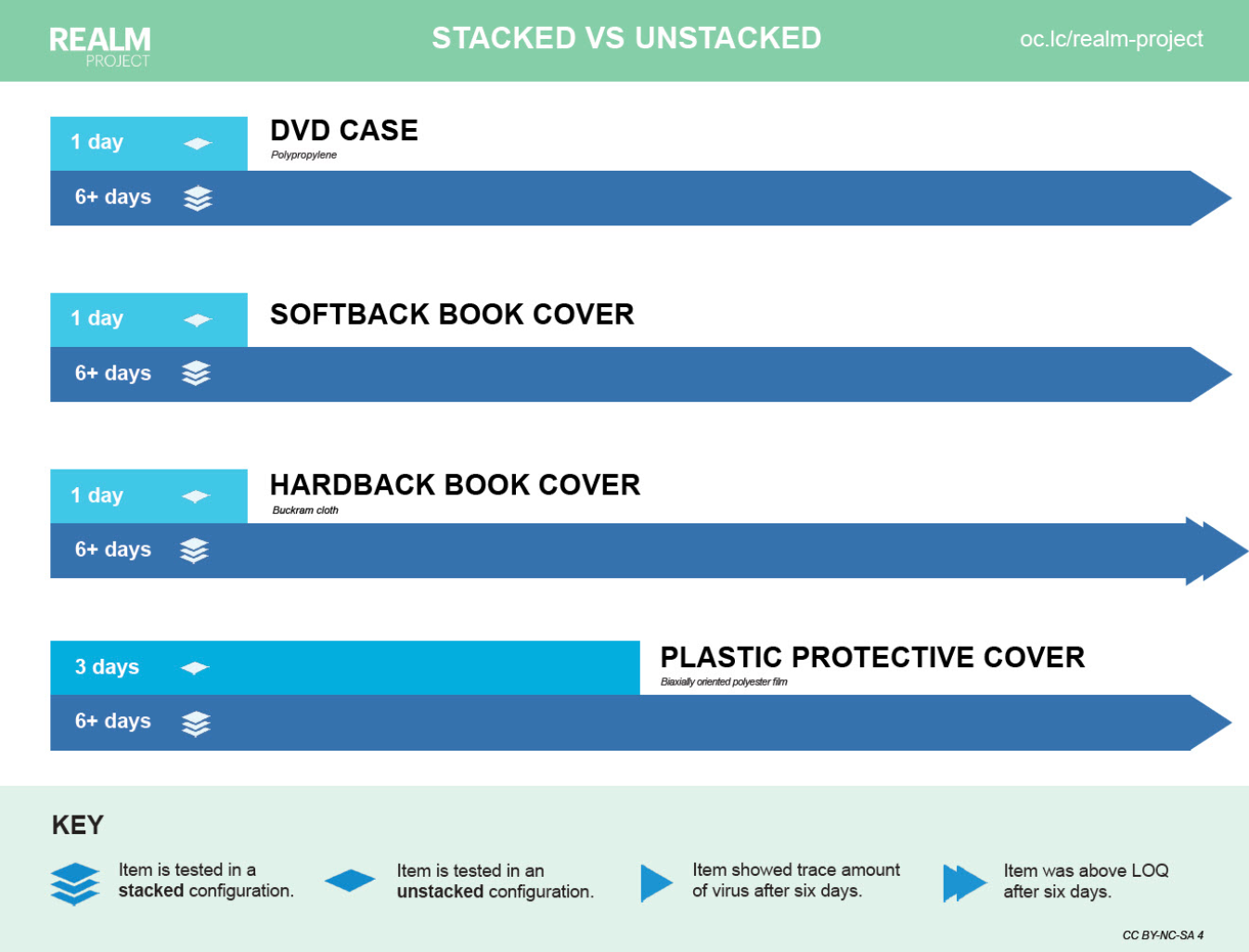REALM Project Test 4 Results Available; Scientists Find Virus Still Detectable After Six Days on Four Common Library Materials When Stacked
From OCLC/WebJunction:
As part of the REALM Project’s research, Battelle has conducted four natural attenuation studies to provide information on how long the virus may survive on materials common to archives, libraries, and museums. The studies were conducted by applying the virulent SARS-CoV-2 virus on five materials held at standard room temperature (68°F to 75°F) and relative humidity conditions (30 to 50 percent). The materials in Test 4 included the following items:
Item Material type Use Hardback book cover Buckram cloth Hardcover book covering Softcover book cover Coated paper Trade paperback cover Plastic protective cover Biaxially oriented polyester film Protective layer for hardcover books DVD case Polypropylene Storage of DVD and CD media Expanded polyethylene foam 1-inch expanded polyethylene foam Storage and shipping Results show that after six days of quarantine the SARS-CoV-2 virus was still detected on all five materials tested. When compared to Test 1, which resulted in nondetectable virus after three days on an unstacked hardcover book, softcover book, plastic protective cover, and DVD case, the results of Test 4 highlight the effect of stacking and its ability to prolong the survivability of the SARS-CoV-2 virus.
Based on the materials’ porous cellulose composition, liquid disinfection methods may not be suitable and may result in material degradation. Longer quarantine time can be considered; or, other methods such as application of heat may promote more rapid decontamination and may warrant further investigation. A literature review that will be available in October 2020 is exploring published research on the effect of heat, UV light, and other methods of disinfection. Organizations such as the Northeast Document Conservation Center have shared information on disinfecting materials for archives, libraries and museums.
Direct to Complete Test Report
8 pages; PDF.
“The REALM project continues to produce results about the coronavirus and how it interacts with library and museum materials,” said IMLS Director Crosby Kemper. “This fourth set of research findings will help librarians and museum professionals continue to offer services and begin to welcome patrons back to public spaces. This ongoing research helps provide an up-to-date and fuller understanding of the virus so that libraries and museums can develop and implement protocols with care in service to their communities.”
“There is still a great deal that we don’t know about the coronavirus and its spread,” said Skip Prichard, OCLC President and CEO. “Our goal is to add to this knowledge in ways that help libraries, archives and museums plan with greater confidence as they re-open and put in place processes to better protect their users and their staffs.”
Filed under: Archives and Special Collections, Associations and Organizations, Journal Articles, Libraries, News, Patrons and Users, Preservation
About Gary Price
Gary Price (gprice@gmail.com) is a librarian, writer, consultant, and frequent conference speaker based in the Washington D.C. metro area. He earned his MLIS degree from Wayne State University in Detroit. Price has won several awards including the SLA Innovations in Technology Award and Alumnus of the Year from the Wayne St. University Library and Information Science Program. From 2006-2009 he was Director of Online Information Services at Ask.com.



